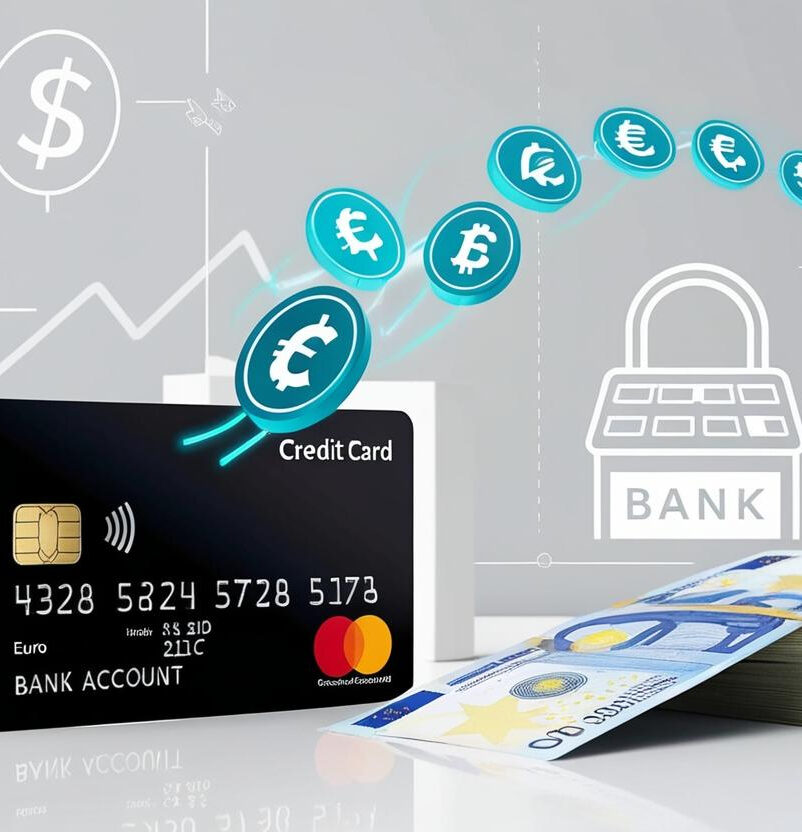Anúncios
When it comes to accessing credit in France, consumers have a range of options and conveniences available to them, even in challenging financial situations. If you’re facing financial difficulties or have an unfavorable credit history, the scenario may seem complicated, but the good news is that there are solutions for those who need credit quickly and easily.
Getting credit may seem like a challenge for those with a negative credit history, but in France, there are still options available for those who are facing financial difficulties or have restrictions on their names. The French financial system offers alternatives that can help overcome the barrier of a past history of defaults and provide quick access to essential resources.
Accessible Credit, Even with Restrictions on Your Name
In France, financial institutions and banks offer various types of loans, including those for people with restrictions on their names or a negative credit history. Compared to other countries, France has a relatively flexible system for people who have faced financial difficulties in the past. This is made possible by the diversity of financial products and policies aimed at financial inclusion.
How Does Credit Work for People with Negative Credit Histories?
Although obtaining credit with a history of defaults can be more difficult, many French financial institutions, such as fintechs and specialized banks, have created alternative solutions to offer credit to these individuals. These banks and digital platforms are increasingly focused on serving a broader range of customers, including those with compromised financial histories.
In France, there is a market for “crédits de reconquête” (recovery credits), which allows people with credit restrictions to obtain loans with more flexible conditions. These options can include longer repayment periods, lower interest rates, or even loans without excessive requirements.
Institutions and Fintechs Offering Credit to Those with Negative Credit Histories
• Banques Traditionnelles (Traditional Banks):
Some traditional banks in France offer credit options for people with negative credit histories, but usually require the customer to provide additional guarantees or a co-signer. The terms and amounts may be more limited, but these institutions still offer a line of credit for those who need financial assistance.
• Fintechs:
French fintech companies like Younited Credit and Lendix are excellent options for those with negative credit histories. These digital companies offer faster and less bureaucratic credit solutions. They focus more on the customer’s current financial situation rather than just the credit history, making the approval process much more accessible for those facing financial difficulties.
• Crédit Social (Social Credit):
Specialized banks, such as Crédit Social des Fonctionnaires, offer credit solutions to those with restrictions, focusing on financial inclusion. These banks tend to be more flexible and may offer personalized alternatives, considering not only the credit score but also the customer’s current financial situation.
Anúncios
• Crédits Renouvelables (Renewable Credit):
Many customers with negative credit histories turn to renewable credits, a type of ongoing credit offered by some financial institutions. This type of credit allows the total amount to be accessed as needed, with the option to pay in installments. For those with name restrictions, renewable credit can be a practical and flexible option.
Simplified Access to Credit
Instead of going through a long and bureaucratic process, as is common in many places, France has platforms and financial solutions that allow you to simulate loans quickly and easily. This means you can get pre-approval without having to face queues or long waiting periods. With just one click, you can discover the best credit options available, taking into account your current financial situation.
Avoid Surprises and Have Clarity on the Terms
When applying for a loan in France, transparency is one of the most valued aspects. Interest rates, administrative fees, and all terms must be clearly explained during the simulation, allowing you to make an informed choice. A great advantage of the French financial system is the “réflexion préalable” (pre-reflection), where the borrower can analyze different credit options before deciding which best fits their profile and needs.
Ease of Adapting to Your Budget
The French credit system offers significant flexibility in payment terms. Loans with adjustable terms and varying monthly payments allow the borrower to adjust the installments to their budget. Even those with restrictions on their name can make financial plans to avoid compromising their financial health.
How to Get Quick Credit in France Even with a Negative Credit History?
• Evaluate Your Current Financial Profile:
Instead of focusing solely on the credit history, many financial institutions evaluate the current financial situation of the applicant. This can be a positive point for those seeking credit with a history of defaults. Proof of stable income, for example, can increase the chances of approval.
• Loan Simulation:
Use online credit simulation platforms to compare the best available offers. Many fintechs offer quick simulators that help identify the best credit conditions based on your financial situation, even if your credit history isn’t ideal.
• Guarantees or Co-signers:
In some cases, having a co-signer or providing guarantees can increase the chances of getting credit approved. By offering a guarantee, you reduce the risk for the bank or financial institution, increasing the likelihood of obtaining a loan.
• Personal Loans and Microcredits:
Microcredits or smaller personal loans can be an interesting solution for those who need quick credit. Some institutions offer this type of loan with short terms and few requirements. Microcredits are often more accessible for people with a negative credit history since the amount involved is smaller.
• Consider Loans Without Credit Score Requirements:
Some fintech platforms, such as Cashper and Crediteo, offer credit without a deep credit score evaluation, focusing more on the customer’s ability to repay. These options can be more flexible and faster, with fewer requirements.
Tips for Those Seeking Credit in France:
1. Consult Several Options:
Compare offers from different banks and financial institutions, as each may offer different interest rates and payment terms.
2. Check Your Budget:
Before requesting a loan, it’s essential to know exactly how much you can afford to pay monthly without compromising other expenses.
3. Research Low-Interest Options:
Some loans can be more advantageous with reduced interest rates for those who have controlled financial situations or co-signers willing to guarantee payment.
4. Use Simulation Platforms:
France has several online platforms that allow you to quickly simulate loan conditions, providing a clear view of how much you will need to pay based on the chosen amount and term.

Precautions When Obtaining Credit with a Negative History
• Evaluate Your Finances Carefully:
Even with the possibility of obtaining credit, it’s essential to assess your ability to repay before applying for any loan. The goal is to avoid excessive debt and ensure that the credit taken fits within your budget.
• Compare Interest Rates:
When seeking credit with a negative history, be mindful of the interest rates, which may be higher due to the risk involved. Compare different offers to ensure you’re choosing the most advantageous option.
• Consider Smaller Loans:
To avoid compromising your repayment ability, consider requesting smaller amounts that fit within your budget. This can reduce the impact on your financial planning and lower the risk of default.
Loan Solutions for People in the “Fichier des Incidents de Remboursement des Crédits aux Particuliers” (FICP)
In France, being listed in the Fichier des Incidents de Remboursement des Crédits aux Particuliers (FICP), the register of defaulters, can be a significant obstacle when obtaining credit. However, even for those listed in this database, there are options for accessing financial resources. The FICP contains information about people who have had difficulty honoring their debts, but this doesn’t mean the possibility of obtaining credit is entirely out of reach.
Credit Options for People in the FICP
1. Personal Loans:
Some financial institutions, such as fintechs and specialized banks, offer personal loans to individuals listed in the FICP. These loans generally have shorter terms and may have higher interest rates due to the higher risk associated with the applicant’s profile. However, the conditions can be more flexible if the borrower can demonstrate current financial stability.
2. Credit with Guarantees:
A common alternative is to offer guarantees, such as an asset or a co-signer, to secure the loan. Financial institutions may be more willing to grant credit when there is collateral, as this reduces the risk for the lender. The presence of a co-signer or valuable asset can increase approval chances, even for those in the FICP.
3. Microcredits and Recovery Loans:
Some microcredit platforms and social credit institutions offer loans specifically for people with a history of defaults. These loans are typically of low value and have moderate interest rates. They are ideal for those seeking to recover financially, as they are more accessible and can help rebuild credit over time.
Conditions and Requirements
Although credit options are available, those in the FICP should be aware that the conditions may be more restrictive. Financial institutions may require:
• Additional Guarantees:
Such as a co-signer or asset.
• Higher Interest Rates:
Due to the higher risk of default.
• Rigorous Financial Analysis:
In addition to the credit history, the institution may analyze the stability of income, such as salary or other sources of income.



